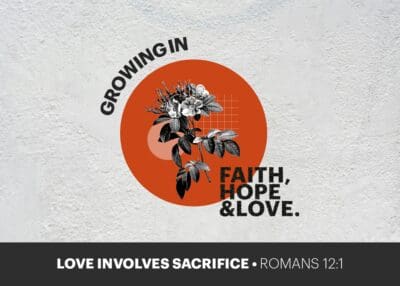“Go and learn what this means, ‘I desire mercy, and not sacrifice.’” (Matthew 9:13)
Think of the difference that one teacher who is merciful can make in a school. Think of the difference in a business or a church or a family when there’s one person with a tender heart who cares and acts for the good of others.
What would this look like if we all did the same? Where and how can I be merciful?
Seven Opportunities for Manifesting Mercy
1. Material needs
If anyone has the world’s goods and sees his brother in need, yet closes his heart against him, how does God’s love abide in him? (1 John 3:17)
The Good Samaritan opened his heart to a person in need and did something to help him. Sinclair Ferguson says:
Mercy is getting down on your hands and knees and doing something to restore dignity to someone whose life has been broken by sin.
Then Ferguson says:
[The Samaritan] did not deal with the cause of the man’s need by chasing the robbers… [and] he did not complain about the failure of society to meet the man’s need… The Samaritan addressed the immediate need set before him and did what he could to bring relief.
2. Spiritual struggles
Have mercy on those who doubt. (Jude 22)
God calls us to have a tender heart towards brothers and sisters in Christ who are struggling in their faith. Have mercy on those who doubt.
I once heard Warren Wiersbe say if he could have his time over again, he would “do more to encourage God’s people.” Lord, save me from being hard and demanding. Make me tender towards others, sensitive to the loads they bear, and faithful in bringing help, as Christ is faithful to me.
Christ does not break the bruised reed. He will not snuff out a smoldering wick. David captures the mercy of God when he says, “Your gentleness has made me great” (Psalm 18:35).
3. Embarrassing failures
Love covers a multitude of sins. (1 Peter 4:8)
Some things should not be covered over. Peter speaks about sins, not crimes, and there’s an important difference. But there are a multitude of sins a merciful person will be glad to cover over. Spurgeon says:
I recommend you, brothers and sisters, always to have one blind eye and one deaf ear.
Notice its only one! In this sinful world you need to have one eye that sees and one ear that hears. But Spurgeon says:
My blind eye is the best eye that I have, and my deaf ear is the best ear I have.
A hard heart always makes a big deal of another person’s failure, but a tender heart, a merciful heart, often uses the blind eye and the deaf ear!
God does not treat us as our sins deserve or repay us according to our iniquities. He is merciful. And love covers over a multitude of sins.
4. Slanderous gossip
Whatever is true, whatever is honorable, whatever is just, whatever is pure, whatever is lovely, whatever is commendable… think about these things. (Philippians 4:8)
Satan is the father of lies. He is always manufacturing rumors that would make a person think less of someone who is their brother or sister in Christ. Some Christians seem to be adept at helping him!
Remember this: It is as bad to believe a lie as it as to tell one. It is as bad to repeat a lie as it is to invent one. There is a harshness in our culture (and too often it is creeping into the church) that is quick to believe the worst about a person, and slow to think the best.
It is so easy to slide into making much of other people’s failings and little of their strengths and virtues. A merciful person goes the other way—he or she will make more of a person’s virtues than their failings. A merciful person will close his ears to slander unless he’s compelled to do otherwise.
5. Unreasonable expectations
God knows our frame; he remembers that we are dust. (Psalm 103:14)
This is one of my favorite verses in the Old Testament. I am so grateful for it. God remembers that I am dust.
I must remember this in relation to others. And, I must not set unreasonable expectations of my spouse, my children, or of others who work with me. I must learn not to be surprised by discouragements and disappointments.
And, I must get beyond thinking that a person will be a consistent paragon of virtue simply because he or she is a Christian. I must think more about the weights and burdens others may carry, and the strength of temptations they may face. And I must remember, as God remembers about me, that they are dust.
6. Personal injuries
Be kind to one another, tenderhearted, forgiving one another, as God in Christ forgave you. (Ephesians 4:32)
If someone has hurt you, injured you, or wronged you in some way, don’t be surprised if at some point God puts you in a position when you have the opportunity to get your own back.
That’s what happened to Joseph. His brothers wronged him terribly, but God blessed him. He became the Prime Minister of Egypt, next to Pharoah himself. One day, the brothers needed food and they came to Egypt, and Joseph had them in his power.
Now, what you do at that moment will be the most revealing thing about you. Joseph forgave his brothers. That’s what mercy does.
7. Lost souls
Save others by snatching them out of the fire; to others show mercy with fear. (Jude 23)
If you have mercy in your heart, you will speak to Christ about lost people and you will speak to lost people about Christ. Augustine said:
If I weep for the body from which the soul is departed. How should I weep for the soul from which God is departed.
A tender heart that cares and acts for the good of others will care deeply about people without Christ, and will act by sharing the gospel with them.
Share Christ
The steadfast love of the Lord never ceases; His mercies never come to an end; they are new every morning; great is your faithfulness. (Lamentations 3:22-23)
This is a Christ to whom you can come. And this is a Christ in whom you can trust. His mercy is not for a moment, but for a lifetime.





